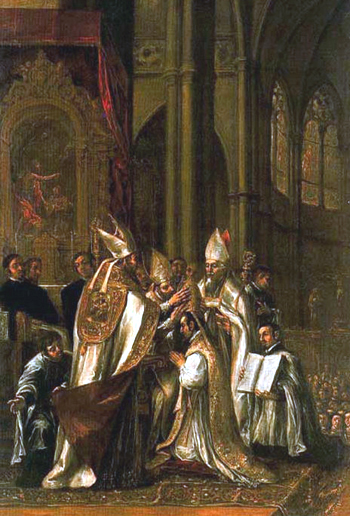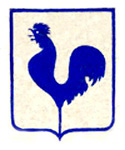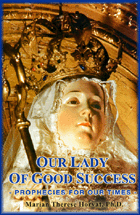Stories & Legends
 |
 |
 |
 |
 |
 |
 |
How Ambrose Was Chosen Bishop of Milan
The Life of St. Ambrose by Paulinus, student and later secretary of the great Bishop of Milan, is one of the few ancient documents on the life of that Father of the Church. Here Paulinus relates how Ambrose, at the time the Roman Consul and Governor stationed in Milan - a still unbaptized catechumen - became Bishop of the city, which was in a state of religious chaos owing to the machinations of the partisans of the Arian heresy.
In 374, after the death of Auxentius, a bishop of the Arian heresy who took possession of the Church of Milan after Dionysius the Confessor, of blessed memory, was sent into exile, the people were about to revolt because they did not have a bishop.
Ambrose, who had recently been appointed consular governor of Liguria and Emilia, had the task of putting down the revolt. So he went to the church, and when he was addressing the people, the voice of a babe in the arms of his mother from among the people is said to have called out suddenly in a clear voice, “Ambrose bishop.”
At the sound of this voice, the mouths of all the people joined in the cry: “Ambrose bishop.”
Thus, those who a while before were disagreeing most violently, because both the Arians and the Catholics wished the other side to be defeated and their own candidate to be consecrated bishop, suddenly agreed on Ambrose with miraculous and unbelievable harmony.
 And when Ambrose realized this, he left the church and had a tribunal prepared for himself in the public square. Then, contrary to his usual behavior, he made a show of giving orders for the application of the torture, hoping, it seemed, to impress the people with an idea that he was both unjust and cruel. But they were not to be deceived. They knew his character. A few months of his rule had shown what kind of man he was. They saw that his pretended tyranny was a feint.
And when Ambrose realized this, he left the church and had a tribunal prepared for himself in the public square. Then, contrary to his usual behavior, he made a show of giving orders for the application of the torture, hoping, it seemed, to impress the people with an idea that he was both unjust and cruel. But they were not to be deceived. They knew his character. A few months of his rule had shown what kind of man he was. They saw that his pretended tyranny was a feint.
So, although he did this, the people nonetheless shouted out, “Your sin be upon us.” But these people did not shout these words as did the people of the Jews – for the Jews by their words shed the Lord’s blood, saying, “His blood be upon us.”
But these people, knowing Ambrose was yet a catechumen, were assuring him with a confident voice the remission of all his sins through the divine grace of Baptism.
Then, in a disturbed state of mind, Ambrose returned home and wanted to declare himself a philosopher and not a theologian, but again the people called out for him to be their bishop. …
Next, he sought refuge in flight, but without success. He was soon found and triumphantly brought back to Milan. All thought that there was something more than human in the circumstances of his election.
And when he had been found and was held in custody by the people, a report was sent to the Emperor Valentinian, who rejoiced in the choice of the people and ordered that Ambrose should forthwith be baptized and consecrated.
Probus the prefect, who had named him consular governor, rejoiced similarly, because his words were fulfilled in Ambrose. For, after making his appointment and sending him out to Milan, Probus had said to him these words, “Go, act not as judge, but as a bishop.”
The provincial bishops also endorsed the action of the Emperor and the people. Ambrose was compelled to consent to receive the office and dignity thus enforced upon him by the whole body of the faithful. For their choice was looked upon not as being of their own mere motion, but, as all agreed, under the manifest guidance of a higher power.
Therefore, when Ambrose realized he could no longer resist, he acceded but he demanded that he should be baptized only by a Catholic Bishop. For he was carefully guarding against the heresy of the Arians.
Thus he was baptized, and within a week from his reception of the sacrament he was duly consecrated as Bishop of Milan and Metropolitan on the 8th day of December in the year 374, to the great joy of all.


Ambrose, who had recently been appointed consular governor of Liguria and Emilia, had the task of putting down the revolt. So he went to the church, and when he was addressing the people, the voice of a babe in the arms of his mother from among the people is said to have called out suddenly in a clear voice, “Ambrose bishop.”
At the sound of this voice, the mouths of all the people joined in the cry: “Ambrose bishop.”
Thus, those who a while before were disagreeing most violently, because both the Arians and the Catholics wished the other side to be defeated and their own candidate to be consecrated bishop, suddenly agreed on Ambrose with miraculous and unbelievable harmony.

St. Ambrose is consecrated Bishop in 374
So, although he did this, the people nonetheless shouted out, “Your sin be upon us.” But these people did not shout these words as did the people of the Jews – for the Jews by their words shed the Lord’s blood, saying, “His blood be upon us.”
But these people, knowing Ambrose was yet a catechumen, were assuring him with a confident voice the remission of all his sins through the divine grace of Baptism.
Then, in a disturbed state of mind, Ambrose returned home and wanted to declare himself a philosopher and not a theologian, but again the people called out for him to be their bishop. …
Next, he sought refuge in flight, but without success. He was soon found and triumphantly brought back to Milan. All thought that there was something more than human in the circumstances of his election.
And when he had been found and was held in custody by the people, a report was sent to the Emperor Valentinian, who rejoiced in the choice of the people and ordered that Ambrose should forthwith be baptized and consecrated.
Probus the prefect, who had named him consular governor, rejoiced similarly, because his words were fulfilled in Ambrose. For, after making his appointment and sending him out to Milan, Probus had said to him these words, “Go, act not as judge, but as a bishop.”
The provincial bishops also endorsed the action of the Emperor and the people. Ambrose was compelled to consent to receive the office and dignity thus enforced upon him by the whole body of the faithful. For their choice was looked upon not as being of their own mere motion, but, as all agreed, under the manifest guidance of a higher power.
Therefore, when Ambrose realized he could no longer resist, he acceded but he demanded that he should be baptized only by a Catholic Bishop. For he was carefully guarding against the heresy of the Arians.
Thus he was baptized, and within a week from his reception of the sacrament he was duly consecrated as Bishop of Milan and Metropolitan on the 8th day of December in the year 374, to the great joy of all.

Adapted from Early Christian Biographies, ed. by Roy J. Defarrari,
Washington DC: Catholic Un. Of America Press, 1952, pp. 36-37
Posted March 9, 2013
Washington DC: Catholic Un. Of America Press, 1952, pp. 36-37
Posted March 9, 2013






